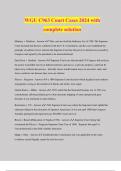Miller v united states - Study guides, Class notes & Summaries
Looking for the best study guides, study notes and summaries about Miller v united states? On this page you'll find 235 study documents about Miller v united states.
Page 3 out of 235 results
Sort by

-
WGU C963 - Court Cases - American Politics and the US Constitution with complete verified solutions
- Exam (elaborations) • 4 pages • 2024
-
- $14.99
- + learn more
Marbury v. Madison (1803) Established judicial review. The courts have the power to strike down laws that they find to violate the Constitution. Dred Scott v. Sanford (1857) The Constitution was not meant to include American citizenship for black people. Brainpower Read More Plessy v. Ferguson (1896) Separate but equal - Racial segregation laws for public facilities are Constitutional as long as the segregated facilities were equal in quality. United States v. Miller (1...

-
WGU C963 - Court Cases - American Politics and the US Constitution Super Study Guide Questions with 100% Correct Answers | Verified | Latest Update | 100% Pass
- Exam (elaborations) • 6 pages • 2024
- Available in package deal
-
- $8.99
- + learn more
WGU C963 - Court Cases - American Politics and the US Constitution Super Study Guide Questions with 100% Correct Answers | Verified | Latest Update | 100% Pass Marbury v. Madison (1803) Established judicial review. The courts have the power to strike down laws that they find to violate the Constitution. Dred Scott v. Sanford (1857) The Constitution was not meant to include American citizenship for black people. Plessy v. Ferguson (1896) Separate but equal - Racial segregation laws for publ...

-
WGU C963 Court Cases Questions and Answers(A+ Solution guide)
- Exam (elaborations) • 4 pages • 2023
- Available in package deal
-
- $7.99
- + learn more
Marbury v. Madison - This case involved the Judiciary Act of 1789. The Supreme Court declared that the law conflicted with the U.S. Constitution, and the case established the principle of judicial review wherein the Supreme Court has the power to declare laws passed by Congress and signed by the president to be unconstitutional. Dred Scott v. Sanford - Supreme Court case that decided US Congress did not have the power to prohibit slavery in federal territories and slaves, as private propert...

-
WGU C963 Court Cases 2024 with complete solution
- Exam (elaborations) • 4 pages • 2024
- Available in package deal
-
- $10.49
- + learn more
WGU C963 Court Cases 2024 with complete solution Marbury v. Madison - Answer ️️ -This case involved the Judiciary Act of 1789. The Supreme Court declared that the law conflicted with the U.S. Constitution, and the case established the principle of judicial review wherein the Supreme Court has the power to declare laws passed by Congress and signed by the president to be unconstitutional. Dred Scott v. Sanford - Answer ️️ -Supreme Court case that decided US Congress did not have th...

-
WGU C963 - Significant Court Cases Practice Exam Questions with 100% Correct Answers | Verified | Latest Update | 100% Pass
- Exam (elaborations) • 7 pages • 2024
- Available in package deal
-
- $9.19
- + learn more
WGU C963 - Significant Court Cases Practice Exam Questions with 100% Correct Answers | Verified | Latest Update | 100% Pass Marbury v. Madison (1803, 5 US 137) This case involved the Judiciary Act of 1789. Supreme Court declared that the law conflicted with the US Constitution, and the case established the principle of judicial review wherein the Supreme Court has the power to declare laws passed by Congress and signed by the President to be unconstitutional. Dred Scott v. Sandford (1856, 60 U...

-
WGU C963 Court Cases (Complete)2024 Graded A+
- Exam (elaborations) • 4 pages • 2024
- Available in package deal
-
- $10.49
- + learn more
WGU C963 Court Cases (Complete)2024 Graded A+ Marbury v. Madison - Answer ️️ -This case involved the Judiciary Act of 1789. The Supreme Court declared that the law conflicted with the U.S. Constitution, and the case established the principle of judicial review wherein the Supreme Court has the power to declare laws passed by Congress and signed by the president to be unconstitutional. Dred Scott v. Sanford - Answer ️️ -Supreme Court case that decided US Congress did not have the po...

-
WGU C963 Court Cases Questions with 100% Correct Answers | Verified | Latest Update | 100% Pass
- Exam (elaborations) • 7 pages • 2024
- Available in package deal
-
- $8.49
- + learn more
WGU C963 Court Cases Questions with 100% Correct Answers | Verified | Latest Update | 100% Pass Marbury v. Madison This case involved the Judiciary Act of 1789. The Supreme Court declared that the law conflicted with the U.S. Constitution, and the case established the principle of judicial review wherein the Supreme Court has the power to declare laws passed by Congress and signed by the president to be unconstitutional. Dred Scott v. Sanford Supreme Court case that decided US Congress did not...

-
Test Bank For American Government Institutions & Policies 14th Edition by James Q. Wilson
- Exam (elaborations) • 292 pages • 2023
- Available in package deal
-
- $31.83
- + learn more
CHAPTER 3 Federalism MULTIPLE CHOICE 1. When the Framers drafted the Constitution, the Antifederalist opposed it primarily on the grounds that the new government a. empowered state governments. b. created a bicameral Congress. c. gave states the power to coin money. d. created a navy. e. gave too much power to the national government. ANS: E REF: 51 NOT: F OBJ: LO1 2. In this decision, the Supreme Court, by a 5–4 majority, ruled that the individual mandate component of Obamacare was...

-
WGU C963 Court Cases exam questions with complete verified solutions 2024
- Exam (elaborations) • 4 pages • 2024
-
- $14.49
- + learn more
Marbury v. Madison This case involved the Judiciary Act of 1789. The Supreme Court declared that the law conflicted with the U.S. Constitution, and the case established the principle of judicial review wherein the Supreme Court has the power to declare laws passed by Congress and signed by the president to be unconstitutional. Dred Scott v. Sanford Supreme Court case that decided US Congress did not have the power to prohibit slavery in federal territories and slaves, as private propert...

-
WGU C963 Court Cases (Complete)2024 Graded A+
- Exam (elaborations) • 4 pages • 2024
- Available in package deal
-
- $10.49
- + learn more
WGU C963 Court Cases (Complete)2024 Graded A+ Marbury v. Madison - Answer ️️ -This case involved the Judiciary Act of 1789. The Supreme Court declared that the law conflicted with the U.S. Constitution, and the case established the principle of judicial review wherein the Supreme Court has the power to declare laws passed by Congress and signed by the president to be unconstitutional. Dred Scott v. Sanford - Answer ️️ -Supreme Court case that decided US Congress did not have the po...

$6.50 for your textbook summary multiplied by 100 fellow students... Do the math: that's a lot of money! Don't be a thief of your own wallet and start uploading yours now. Discover all about earning on Stuvia


